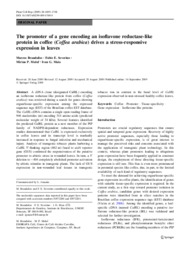The promoter of a gene encoding an isoflavone reductase-like protein in coffee (Coffea arabica) drives a stress-responsive expression in leaves.
The promoter of a gene encoding an isoflavone reductase-like protein in coffee (Coffea arabica) drives a stress-responsive expression in leaves.
Author(s): BRANDALISE, M.; SEVERINO, F. E.; MALUF, M. P.; MAIA, I. G.
Summary: A cDNA clone (designated CaIRL) encoding an isoflavone reductase-like protein from coffee (Coffea arabica) was retrieved during a search for genes showing organ/tissue-specific expression among the expressed sequence tags (EST) of the Brazilian coffee EST database. The CaIRL cDNA contains a single open reading frame of 946 nucleotides (nt) encoding 314 amino acids (predicted molecular weight of 34 kDa). Several features identified the predicted CaIRL protein as a new member of the PIP family of NADPH-dependent reductases. Expression studies demonstrated that CaIRL is expressed exclusively in coffee leaves and its transcript level is markedly increased in response to fungal infection and mechanical injury. Analysis of transgenic tobacco plants harboring a CaIRL 50-flanking region (862 nt) fused to uidA reporter gene (GUS) confirmed the responsiveness of the putative promoter to abiotic stress in wounded leaves. In turn, a 50 deletion to -404 completely abolished promoter activation by abiotic stimulus in transgenic plants. The lack of GUS expression in non-wounded leaf tissues in transgenic tobacco was in contrast to the basal level of CaIRL expression observed in non-stressed healthy coffee leaves.
Publication year: 2009
Types of publication: Journal article
Unit: Embrapa Coffee
Keywords: Coffee, Gene expression, Isoflavone-like proteins, Promoter, Tissue-specificity
Observation
Some of Embrapa's publications are published as ePub files. To read them, use or download one of the following free software options to your computer or mobile device. Android: Google Play Books; IOS: iBooks; Windows and Linux: Calibre.
Access other publications
Access the Agricultural Research Database (BDPA) to consult Embrapa's full library collection and records.
Visit Embrapa Bookstore to purchase books and other publications sold by Embrapa.

